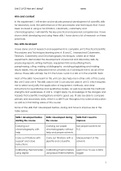Unit 2 LA D How am I doing? name
Aim and context:
In this experiment, I will review and evaluate personal development of scientific skills
for laboratory work, the performance of the procedures and techniques that I have
been involved in using so far (titration, colorimetry, calorimetry and
chromatography). I will identify the key practical and personal competencies I have
shown whilst developing and using these skills. I have done a lot of research on these
practicals.
Key skills developed:
I have done a lot of research and experiments to complete unit 2 Practical Scientific
Procedures and Techniques learning aims A, B and C. I researched Colorimetry,
Titrations, Calorimetry and Chromatography techniques, where all of these
experiments demanded the development of personal and laboratory skills. By
producing reports, writing methods, equipment lists and justifying them,
paraphrasing, citing, making a bibliography, avoiding plagiarising and making
results tables, this unit prepared me for university as it will require me to do all of the
above. These skills will help me if in the future I work in a lab or in the scientific field.
Most of the skills I have learnt in this unit can also help me in other units of this course
like unit 3 and unit 4. The skills used in Unit 3 can also be used in unit 3, which requires
me to select and justify the application of equipment, methods, and clear
instructions for quantitative and qualitative studies, as well as evaluate the methods'
strengths and weaknesses. In Unit 4, I might apply my knowledge of the dangers and
hazards that scientific investigations entail to good use. I'll also be able to compare
primary and secondary data, which is a skill I'll use throughout my science education
as well as in the testing areas of this course.
Some of the skills that I developed before, during and have to improve are in the
table below:
Skills I developed before Skills I developed during Skills that I need to
starting the course the course improve
Carrying out Carrying out paper Use proper solvents for
chromatography with chromatography without TLC.
help help and proper solvents.
Carry out titrations with Carry out titrations with a Measurement of the
support and close pipette and a burette. solvents
instructions
Calibrating thermometers Calibrating thermometers Learn how to use a data
using digital using liquid thermometers logger
1
, Unit 2 LA D How am I doing? name
thermometers
Weighing solids to 2 Weighing to 4 decimal Weighing liquids to 3
decimal places and places with solids and 1 decimal places.
liquids to a whole gram decimal places with
liquids.
Use a plastic pipette to Use graduated pipette to Use of pipette pumps
measure and transfer the measure and transfer the
liquids from one container liquids from one container
to another. to another or burette.
Did not know how to use Calibrating and using a Calibration of
a calorimeter. colorimeter with support colorimeters without
and close instructions support.
D.P7 Awarded
Skills developed in chromatography:
Before doing this unit, I knew how to carry out paper chromatography and how to
calculate the Rf value of a chromatogram but I did not know how to carry out TLC
or knew which solvents to use. But while doing LA B, I have learnt how to carry out
TLC and learnt what solvents to use but I still have to improve my ways to make the
pigment and use the proper solvent for TLC. One factor that could have jeopardised
this experiment is that I did not thoroughly crush the leaves and put too much sand
while producing the plant pigment with the pestle and mortar, which could have
been the reason why none of my chromatograms separated mixtures. To improve
this, next time I should put less sand and crush the sand more thoroughly. Another
issue that could have been avoided was when I used too much pigment in the
midpoint of the capillary tube, resulting in a large dot, which could have been the
reason why the first chromatogram took so long to get a result. Some of my
classmates dipped the pencil line (where the pigment dot is placed) in the solvent
(in the gas jar) which is why they did not get any results and why they had to repeat
their chromatograms again, and some had their chromatograms curved, so the
solvent took more time to travel. I had to repeat my chromatogram again because
my pencil line was too low and the solvent reached above the line. For the
separation of complicated mixtures of amino acids, peptides, carbohydrates,
steroids, purines, and a lengthy list of simple chemical compounds, paper
chromatography has become standard practise. On paper, inorganic ions can also
be easily separated. Paper chromatography is a qualitatively analytical chemistry
2




